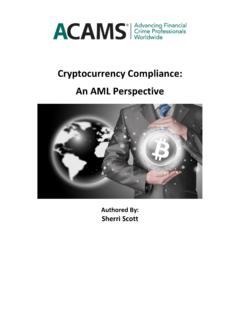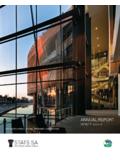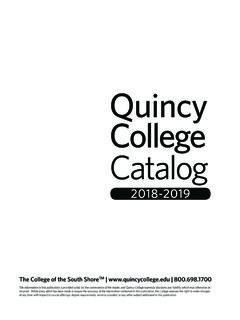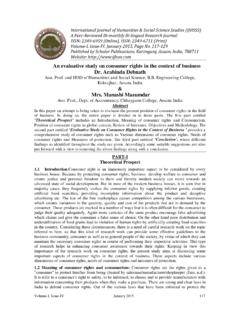Transcription of DEMOCRATIC ALLIANCE Applicant - SAFLII
1 CONSTITUTIONAL COURT OF SOUTH AFRICA Case CCT 76/14 In the matter between: DEMOCRATIC ALLIANCE Applicant and AFRICAN NATIONAL CONGRESS First Respondent INDEPENDENT ELECTORAL COMMISSION Second Respondent Neutral citation: DEMOCRATIC ALLIANCE v African National Congress and Another [2015] ZACC 1 Coram: Moseneke DCJ, Cameron J, Froneman J, Jafta J, Khampepe J, Leeuw AJ, Madlanga J, Nkabinde J, Van der Westhuizen J and Zondo J Judgments: Zondo J with Jafta J and Leeuw AJ concurring (main judgment): [1] to [115] Cameron J, Froneman J and Khampepe J with Moseneke DCJ and Nkabinde J concurring (joint judgment): [116] to [169] Van der Westhuizen J with Madlanga J concurring (separate judgment): [170] to [208] Order: [169] Heard on: 11 September 2014 Decided on: 19 January 2015 Summary: Alleged breach of section 89(2)(c) of the Electoral Act publication of false information to influence outcome of election alleged breach of Electoral Code of Conduct defence of fair comment opinion sections 16 and 19 of the Constitution 2 freedom of expression right to vote right to free and fair elections does section 89(2)(c) of Electoral Act apply to a statement of opinion or does it apply only to statements of fact?
2 Analysis of case law on fair comment penal provisions to be interpreted restrictively was published statement false? statement that the Nkandla report shows how Zuma stole your money to build his R246m home held to be opinion and not statement of fact and not to breach section 89(2)(c) of Electoral Act appeal from Electoral Court to Supreme Court of Appeal competent leave to appeal granted appeal upheld decision of Electoral Court set aside. ORDER On appeal from the Electoral Court (hearing an appeal from the South Gauteng High Court, Johannesburg): 1. Leave to appeal is granted. 2. There is no order as to costs. 3. The order of the Electoral Court is set aside and replaced with the following: The appeal is dismissed. JUDGMENT ZONDO J (Jafta J and Leeuw AJ concurring): Introduction [1] This case concerns a statement published by the DEMOCRATIC ALLIANCE ( Applicant ) on 20 March 2014 by way of a bulk short message service (SMS) to more than million potential voters in Gauteng concerning President Jacob Zuma, ZONDO J 3 President of the African National Congress(first respondent) and of the country.
3 The Applicant sent the SMS with the intention of persuading the recipients thereof to vote for itself and not to vote for the first respondent, its main political rival. President Zuma was the first respondent s presidential candidate for the May 7, 2014 elections. The elections were for members of Parliament and Provincial Legislatures. [2] The first respondent took the view that the Applicant s statement about its President was false and was published with the intention of influencing the outcome of the election. It also contended that, for that reason, the SMS constituted a breach of section 89(2)(c) of the Electoral Act1 and/or item 9(1)(b) of the Electoral Code of Conduct issued under the Electoral Act. It, therefore, made an application to the South Gauteng Division of the High Court (High Court) for an interdict and other relief against the Applicant on the basis that the Applicant was not entitled to publish the SMS.
4 [3] The Applicant contended that the SMS constituted fair comment or an opinion that could be honestly and genuinely held by any fair person, that the SMS was not false and that the publication of the statement did not constitute a breach of section 89(2)(c) of the Electoral Act or item 9(1)(b) of the Electoral Code of Conduct. [4] This case raises the question of the relationship or intersection between, on the one hand, the Applicant s right to freedom of expression2 which includes the right to 1 73 of 1998. 2 Section 16 of the Constitution reads: (1) Everyone has the right to freedom of expression, which includes (a) freedom of the press and other media; (b) freedom to receive or impart information or ideas; (c) freedom of artistic creativity; and (d) academic freedom and freedom of scientific research.
5 (2) The right in subsection (1) does not extend to (a) propaganda for war; (b) incitement of imminent violence; or ZONDO J 4 impart information or ideas as well as the constitutional right to campaign for a political party or cause and, on the other, the right to free and fair elections3 and every adult citizen s right to In this regard it must be emphasised that this Court has said that the right to vote entrenched in section 19(3) of our Constitution is a right to vote in free and fair It has also said that the right to vote is indispensable to, and empty without, the right to free and fair elections .6 [5] The publication of false information by a political party or a candidate for election concerning a rival political party or a rival candidate in order to gain votes or in order for certain voters not to vote for a certain party is anathema to the notion of free and fair elections and may violate the citizens right to free and fair elections.
6 A statutory prohibition of the publication of a false statement during election campaigns is a limitation of the right to freedom of expression and the right to campaign. However, at the same time such a prohibition enhances the right to free and fair elections. All of these rights entrenched in our Bill of Rights will need to be borne in mind in interpreting section 89(2)(c) of the Electoral Act. However, before I deal with the question whether the Applicant was entitled to publish the SMS in issue, it is necessary to set out the background to the dispute. (c) advocacy of hatred that is based on race, ethnicity, gender or religion, and that constitutes incitement to cause harm.
7 3 Section 19(2) of the Constitution reads: Every citizen has the right to free, fair and regular elections for any legislative body established in terms of the Constitution. 4 Section 19(3) of the Constitution reads: Every adult citizen has the right (a) to vote in elections for any legislative body established in terms of the Constitution, and to do so in secret; and (b) to stand for public office and, if elected, to hold office. 5 See New National Party of South Africa v Government of the Republic of South Africa and Others [1999] ZACC 5; 1999 (3) SA 191 (CC); 1999 (5) BCLR 489 (CC) (New National Party) at para 14. 6 Id at para 12. ZONDO J 5 Background7 [6] The Applicant is a registered political party. It is the official opposition party in Parliament. The first respondent is also a registered political party.
8 It is the ruling party in South Africa and has been the ruling party since the historic elections of 1994. [7] President Zuma became President of the first respondent in December 2007. Less than two years later, in May 2009, he became President of the country. [8] In May 2009 officials of the Department of Public Works (DPW) and representatives of the South African Police Service (SAPS) visited President Zuma s private residence in Nkandla, KwaZulu-Natal to determine whether the residence had sufficient security measures to ensure the safety of the President and his family. They found that the residence did not have sufficient security measures. [9] In about 2009 President Zuma made arrangements for the design and, ultimately, the building of three additional houses in the Nkandla residence.
9 To this end, he appointed Mr Makhanya, an architect. [10] In August 2009 the DPW secured the approval of an amount of R27 893 067 for the installation of security measures in the President s private residence. By February 2010 the costs were estimated to have escalated to about R80 836 249. By July 2010 they were said to have gone up to R130 604 [11] In about December 2011 the Public Protector received complaints about the escalating costs that were being incurred in connection with the installation of alleged security measures in President Zuma s private residence. The complainants included the Applicant and some members of the public. The complainants requested the 7 Most of the background used here is taken from the Public Protector s Report titled Secure in Comfort dated March 2014 (also known as the Nkandla Report).
10 According to the report, the Public Protector furnished the President with a provisional report to enable the President to comment on it before the final report was released to the public. It does not appear that the President disputed any aspects of the background used here. ZONDO J 6 Public Protector to investigate the costs. The Public Protector s investigation took two years. [12] On 18 February 2014 President Zuma declared 7 May 2014 as a public holiday and the day on which national and provincial elections would be held. In due course the Applicant , the first respondent and other political parties that were registered to contest the elections signed the Electoral Code of Conduct issued under the Electoral Act and committed themselves to observing its provisions. [13] On 19 March 2014 the Public Protector released the report of her investigation.














